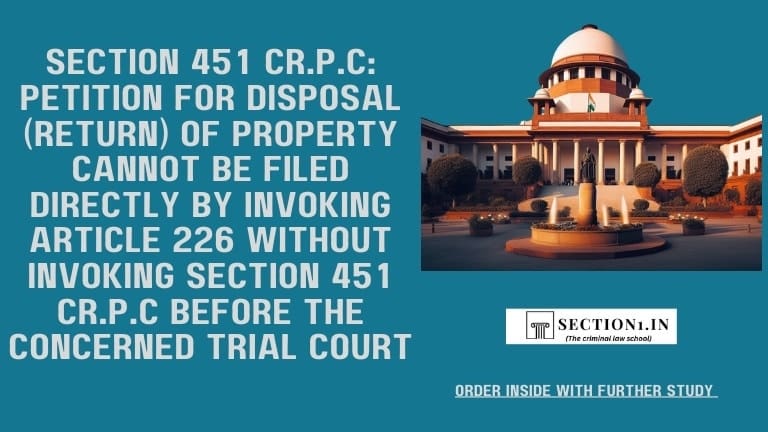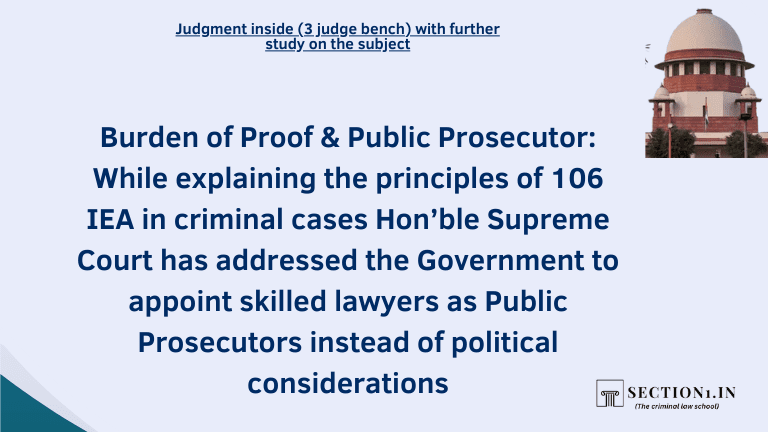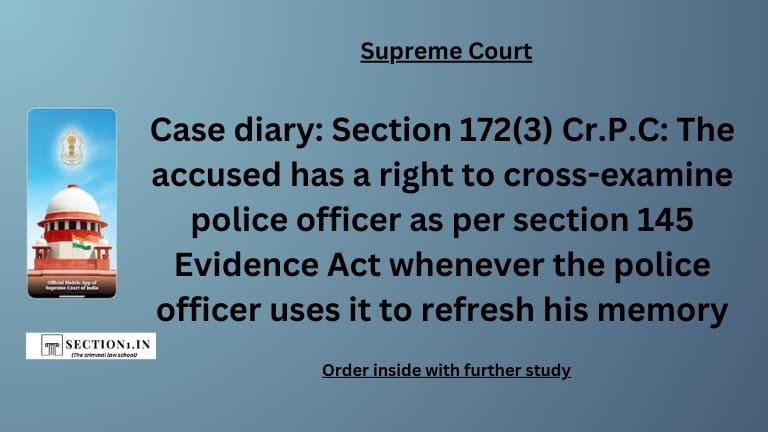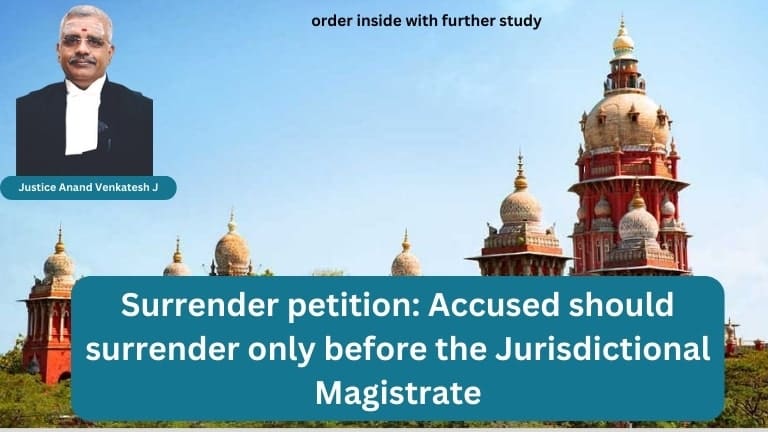Petition for release of vehicle was dismissed by the Hon’ble High Court
1. The appellant, claiming to be the owner of the vehicle being Eicher 10.80 (Blue) bearing no. GJ 05-BT-0899, seized as Muddamal Article in connection with the FIR bearing Criminal No.11200038231465/2023, for the offence Under Section 65- (a)(e),81,98(2),116(2) of Gujarat Prohibition Act and U/s 465, 468, 471, 114 of IPC registered with the Pardi Police Station, District Valasad, had filed the Special Criminal Application No.6465 of 2023 before the High Court of Gujarat at Ahmedabad seeking release of the said vehicle. The said Application having been dismissed by the High Court vide the impugned order dated 08.06.2023, the present Appeal has been filed.
Facts behind the seizure of vehicle
2. In the instant case, it appears that the police personnel when they were on patrolling duty had intercepted the vehicle in question on the basis of a secret information received by them. It was alleged that the driver of the said vehicle was carrying English Liquor (1240.200 litres) worth of rupees 7 lakhs in the said vehicle without any pass or permit. The said vehicle along with the liquor was seized and the aforestated FIR was registered against the accused Lakhabhai Khengarbhai (the son of the present appellant), and others on 29.04.2023 at the Police Station Pardi, Valasad.
Scope and object of Disposal of property
4. At the outset, it may be noted that Chapter XXXIV of Cr.P.C deals with the disposal of the property. Section 451 thereof pertains to the order to be passed by the Criminal Court for custody and disposal of the property produced before the court pending an inquiry or trial, whereas Section 452 pertains to the order to be passed for the disposal or confiscation of the property at the conclusion of the trial. Section 451 reads as under: –
“451. Order for custody and disposal of property pending trial in certain cases. — When any property is produced before any Criminal Court during any inquiry or trial, the Court may make such order as it thinks fit for the proper custody of such property pending the conclusion of the inquiry or trial, and, if the property is subject to speedy and natural decay, or if it is otherwise expedient so to do, the Court may, after recording such evidence as it thinks necessary, order it to be sold or otherwise disposed of. Explanation. —For the purposes of this section, “property” includes— (a) property of any kind or document which is produced before the Court or which is in its custody; (b) any property regarding which an offence appears to have been committed or which appears to have been used for the commission of any offence.”
5. From the bare reading of the aforesaid provision, it clearly transpires that when any property is produced before any criminal court during the course of inquiry or trial, the Court is required to make such order as it thinks fit for the proper custody of such property pending the conclusion of the inquiry or the trial. If the property is subject to speedy and natural decay, or if it is otherwise expedient so to do, the Court may after recording such evidence as it thinks necessary, order it to be sold or otherwise disposed of. Thus, it is the criminal court, before whom the property in question is sought to be produced, would have the jurisdiction and the power to pass appropriate orders for the proper custody of such property or for selling or disposing of such property, having regard to the nature of the property in question, after recording the evidence in that regard.
Petition for disposal (return) of property cannot be filed invoking Article 226 directly without invoking section 451 Cr.P.C before the concerned court
6. In the instant case, the appellant without approaching the concerned court under Section 451, Cr.P.C, directly approached the High Court by filing Special Criminal Application under Article 226/227 of the Constitution of India, which could not be said to be the proper course of action for getting the custody of the property i.e. the vehicle in question in this case. When there is a specific statutory provision contained in the Cr.P.C. empowering the criminal court to pass appropriate order for the proper custody and disposal of the property pending the inquiry or trial, the appellant could not have invoked the extraordinary jurisdiction of the High Court under Article 226 of the Constitution of India seeking release of his vehicle.
How to read a provision?
9. When the conjunction “but” is used in a provision, after the punctuation mark “comma”, it is deemed that such conjunction is used to carve out an exception or proviso to the main provision. Meaning thereby, when the entire provision is divided into two parts by using the punctuation mark “comma” followed by the conjunctive word “but”, the second part is required to be construed as an exception or proviso to the first part. However, so far as sub-section (2) of Section 98 is concerned though it is in two parts connected with the conjunctive word “but”, there is hardly any co-relation between the first part and the second part thereof. It is difficult to comprehend the second part of sub-section (2) as an exception or proviso to the first part thereof. Since it is not happily worded, applying the doctrine of harmonious construction, we will have to harmonise the provisions contained therein with the other provisions of the Act and with the provisions contained in the Cr.P.C.
Seizure and confiscation though not explained in crpc is explained by the Hon’ble Supreme Court
10. It is pertinent to note that the words “confiscation” or “seizure” are not defined either in the said Act or in the Cr.P.C. As per the Black’s Law Dictionary in the 11th Edition, the word “confiscation” means seizure of property for the public treasury or seizure of property by actual or supposed authority, and the word “seizure” means an act or an instance of taking possession of a person or property by legal right or process. Having regard to the said meanings, it is clear that “seizure” would be a preliminary step that would lead to confiscation of an article seized. The power to seize an article may be exercised by the statutory authorities like police personnel, prohibition officers, revenue authorities etc. in accordance with the concerned Statutes, whereas the power of confiscation is normally exercised by the jurisdictional Courts in accordance with the provisions of the concerned Statutes.
14. Thus, on the conjoint reading of the provisions contained in Section 98 and 132 of the said Act and of Section 451 Cr.PC, it is discernible that all these provisions operate in different fields. Section 98 deals with the Confiscation of the Articles whenever any offence punishable under the Act has been committed. The second part of sub-section (2) thereof would come into play when the Prohibition Officer or Police Officer sends the seized article liable to be confiscated but not required as an evidence, to the Collector as per Clause (b) of Section 132. However, Section 451 of the Cr.P.C. would come into play when the article property seized during the course of inquiry or investigation is produced before the jurisdictional Court as per Clause (a) of Section 132 and the Court is called upon to pass appropriate orders for the proper custody of such article/property pending the conclusion of the inquiry or the trial.
16. It is true that when the property/vehicle is seized during the course of investigation and the same is produced before the concerned Criminal Court, it is incumbent on the part of the concerned Court to pass appropriate orders for keeping the vehicle in proper custody pending the trial. It is also true that as held by this Court in case of Sunderbhai Ambalal Desai vs. State of Gujarat1 , it is of no use to keep the seized vehicles at the police stations for a long period and it is for the magistrate to pass appropriate orders for the proper custody of the said such vehicles during the pendency of the trial. However, as observed earlier, the appellant without approaching the concerned criminal court under Section 451 of the Cr.P.C seeking custody of the vehicle in question, directly approached the High Court by filing Special Criminal Application under Article 226/227 of the Constitution of India, which was not the proper course as adopted by the appellant.
Petition dismissed.
Party
KHENGARBHAI LAKHABHAI DAMBHALA …APPELLANT(S) VERSUS THE STATE OF GUJARAT …RESPONDENT(S) – CRIMINAL APPEAL NO.1547 OF 2024 – 2024 INSC 285.
https://webapi.sci.gov.in/supremecourt/2023/32093/32093_2023_15_1501_52056_Judgement_08-Apr-2024.pdf
Further Study
- OFFICERS INVESTIGATING THE OFFENCE ARE DUTY BOUND TO BE VIGILANT BEFORE INVOKING ANY PROVISION OF A VERY STRINGENT STATUTE, LIKE THE SC/ST ACT
- Automatic vacation of stay: Asian Resurfacing judgment resurfaced
- Return of Property – Vehicle – Section. 451 – Court & Confiscating Authority roles – Explained.
- Section 451 / 457 Cr.P.C: Return of Property: There is no bar to release the property in NDPS Act
- NDPS ACT – SEIZED SUBSTANCE IN THE PRESENSE OF GAZETTED OFFICER NOT CERTIFIED BY THE MAGISTRATE HAS NO EVIDENTIARY VALUE







2 Comments
[…] Section 451 Cr.P.C: Petition for disposal (return) of property cannot be filed directly by invoking … […]
[…] Section 451 Cr.P.C: Petition for disposal (return) of property cannot be filed directly by invoking … […]